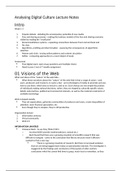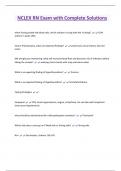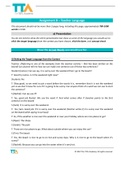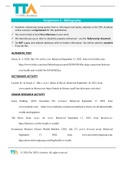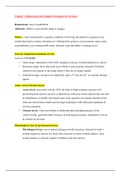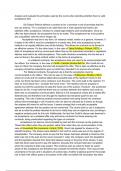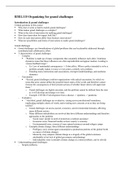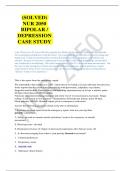Equity and Trusts 2 Lecture 4
Learning Objectives
• Consider Quistclose trusts
• Explore presumed* resulting trusts:
Voluntary transfer: land
(Purchase in the name of another)
• Questions
Recap:
• Idea of a resulting trust is that property ‘results back’ to original/rightful owner/settlor
• A type of implied trust
• Arises in a variety of situations e.g. surplus funds
• Focused on automatic RTs
Perhaps 3 theories of RTs:
• Megarry J, Vandervell’s Trusts (No 2) 1974: 2 types, automatic & presumed
• Lord Browne-Wilkinson Westdeutsche LB Girozentrale v Islington LBC, 1996: all types of RT
are based on intention (of both parties)
• Lord Millett Air Jamaica v Joy Charlton, 1999: absence of intention from original owner to
transfer the property, returns, subject to contractual rights in the property but issue is that
interests need to be disposed of to jump back.
Quistclose-type trusts – read virgo
A special type of trust, hard to categorise. When thinking about trusts, remember the following:
• Easy to declare a trust (no formalities, except land)
• If trust fails, then a RT arises & current owner holds on trust for original owner so it bounces
back
• KEY: Property on trusts is protected from creditors – must be held by the trustees (in
bankruptcy) for the beneficiaries(creditors)
, Barclays Bank v Quistclose Investments [1970} AC 567 - check
Rolls Razor Ltd owed £484,000 to Barclays. It needed money to pay a dividend to its shareholders
Quistclose agreed to lend £209,719 on condition that the dividend be paid with it and placed in a
separate account. Before the dividend was paid RR went into liquidation. Q sought to recover the
money, B contended that it was part of the assets of the company and should be used to pay its
debts.
- Was there a trust? Yes, so the money was protected and so Barclays
couldn’t use it to pay back the debts.
- Did Barclays know about the trust?Yes.
- Has Quistclose got a proprietary interest in the money
HELD: Lord Wilberforce that the purpose having failed (primary, express trust), the money was held
on resulting trust for Q i.e. gained priority over the claims of Barclays (contractual claim – debt)
- The secondary trust is a resulting trust because the primary trust failed.
- Primary and secondary trust are the twp limbs of the same trust
- The beneficial interest remains with the lender throughout but the borrower
takes the money subject to a power or trust.
- Rr receives all the beneficial interest in the money but Quisclost
Twinsectra Ltd v Yardley [2002] 2 All ER 377 - CHECK
T lent £1m to Y to buy land. Y spent £357,720 elsewhere on Mr Sims. Sims gave an undertaking to
Twinsectra (legal promise) that the money would be used solely for the acquisition of the property.
In breach of his undertaking Sims passed onto leach, leach passed onto solicitor and he used it for
another purpose/ T sued for return. £1m had →Y’s solicitor Mr Sims (undertaking re purpose). Was
this a trust?
Lord Millett: A lender will often will enquire into the purpose
Problems with the Quistclose 2 trusts analysis at [187]
“formidable difficulties in this analysis, which has little academic support….”
Twinsectra Ltd v Yardley [2002] 2 All ER 377
“…..What if the primary trust is not for identifiable persons, but as in the present case to carry out an
abstract purpose? Where in such a case is the beneficial interest pending the application for the
stated purpose of the failure of the purpose?”
Conclusion: beneficiary must be the lender from the start (certainty of objects). A resulting trust,
with borrower having a ‘mere power’ ‘to apply the money for a stated purpose’
Millett took same approach in Air Jamaica (pension surplus)
But issues with this approach:
Learning Objectives
• Consider Quistclose trusts
• Explore presumed* resulting trusts:
Voluntary transfer: land
(Purchase in the name of another)
• Questions
Recap:
• Idea of a resulting trust is that property ‘results back’ to original/rightful owner/settlor
• A type of implied trust
• Arises in a variety of situations e.g. surplus funds
• Focused on automatic RTs
Perhaps 3 theories of RTs:
• Megarry J, Vandervell’s Trusts (No 2) 1974: 2 types, automatic & presumed
• Lord Browne-Wilkinson Westdeutsche LB Girozentrale v Islington LBC, 1996: all types of RT
are based on intention (of both parties)
• Lord Millett Air Jamaica v Joy Charlton, 1999: absence of intention from original owner to
transfer the property, returns, subject to contractual rights in the property but issue is that
interests need to be disposed of to jump back.
Quistclose-type trusts – read virgo
A special type of trust, hard to categorise. When thinking about trusts, remember the following:
• Easy to declare a trust (no formalities, except land)
• If trust fails, then a RT arises & current owner holds on trust for original owner so it bounces
back
• KEY: Property on trusts is protected from creditors – must be held by the trustees (in
bankruptcy) for the beneficiaries(creditors)
, Barclays Bank v Quistclose Investments [1970} AC 567 - check
Rolls Razor Ltd owed £484,000 to Barclays. It needed money to pay a dividend to its shareholders
Quistclose agreed to lend £209,719 on condition that the dividend be paid with it and placed in a
separate account. Before the dividend was paid RR went into liquidation. Q sought to recover the
money, B contended that it was part of the assets of the company and should be used to pay its
debts.
- Was there a trust? Yes, so the money was protected and so Barclays
couldn’t use it to pay back the debts.
- Did Barclays know about the trust?Yes.
- Has Quistclose got a proprietary interest in the money
HELD: Lord Wilberforce that the purpose having failed (primary, express trust), the money was held
on resulting trust for Q i.e. gained priority over the claims of Barclays (contractual claim – debt)
- The secondary trust is a resulting trust because the primary trust failed.
- Primary and secondary trust are the twp limbs of the same trust
- The beneficial interest remains with the lender throughout but the borrower
takes the money subject to a power or trust.
- Rr receives all the beneficial interest in the money but Quisclost
Twinsectra Ltd v Yardley [2002] 2 All ER 377 - CHECK
T lent £1m to Y to buy land. Y spent £357,720 elsewhere on Mr Sims. Sims gave an undertaking to
Twinsectra (legal promise) that the money would be used solely for the acquisition of the property.
In breach of his undertaking Sims passed onto leach, leach passed onto solicitor and he used it for
another purpose/ T sued for return. £1m had →Y’s solicitor Mr Sims (undertaking re purpose). Was
this a trust?
Lord Millett: A lender will often will enquire into the purpose
Problems with the Quistclose 2 trusts analysis at [187]
“formidable difficulties in this analysis, which has little academic support….”
Twinsectra Ltd v Yardley [2002] 2 All ER 377
“…..What if the primary trust is not for identifiable persons, but as in the present case to carry out an
abstract purpose? Where in such a case is the beneficial interest pending the application for the
stated purpose of the failure of the purpose?”
Conclusion: beneficiary must be the lender from the start (certainty of objects). A resulting trust,
with borrower having a ‘mere power’ ‘to apply the money for a stated purpose’
Millett took same approach in Air Jamaica (pension surplus)
But issues with this approach:


